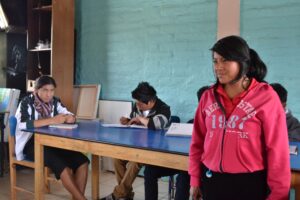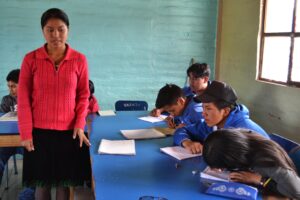Engaged Anthropology Grant: Nicholas Limerick

Nicholas Limerick is an Assistant Professor of Anthropology and Education at Teachers College, Columbia University. In 2011 while a doctoral student at the University of Pennsylvania he received a Dissertation Fieldwork Grant to aid research on ‘Contested Language Ideologies and the Mediation of Indigenous Schooling in Ecuador,’ supervised by Dr. Asif Agha. In 2015 he received an Engaged Anthropology Grant to aid engaged activities on ‘Workshops on Multicultural Recognition and Quechua Language Use in Intercultural Bilingual Education in Ecuador,’ 2015, Ecuador.
Ecuador is frequently lauded for its successful Indigenous political movements. In 1988, Indigenous activists institutionalized a national-level intercultural bilingual school system that would be run by Native individuals for Native students. My dissertation research, which occurred from 2011 to 2013, showed how these advances have also led to challenges for Quichua individuals who have now become upper-level state agents in the school system. Through years of ethnographic research, including in coordinating offices of Ecuador’s Ministry of Education, my research has considered the shifting roles that Indigenous individuals have had to exhibit, and the emerging publics whom they engage, as they invoke the discourses of the state as Native individuals. I show how their work in the office frequently places them in a double-bind, where speaking in the framings of liberal multicultural recognition, including how they speak in the language Quichua, sounds quite different from notions of linguistic diversity that their Indigenous constituents hold. Such differences contribute to pervasive divides across the organization.
With the Wenner-Gren Engaged Anthropology Grant, I planned to conduct workshops in the offices in the Ministry of Education, and in one school where I conducted research, using the findings of my dissertation to help improve public speaking in Quichua and in Spanish. Though I had returned to my fieldsites since the conclusion of my dissertation research, when I returned to the Ministry of Education in June of 2015, I found that the staff had been greatly reduced. Many of my friends had recently been forced into retirement, or they had transferred to work in other offices in the Ministry of Education or in other provinces of Ecuador. This change is the latest step of educational reform in Ecuador, part of which I have studied in my research.

Given these circumstances, as well as an unusually tense political climate for Indigenous individuals coordinating EIB, I decided to carry out workshops only with directors and teachers of one of the schools where I have long collaborated and conducted research. In June, administrators of the school and I piloted a Quichua education program that would promote speaking by the students in distinct registers of Quichua in the same classroom. Through the creation of their own books, students attempted to valorize non-standardized registers of communication, culminating in storytelling events with prizes for the students. The directors of the school and I then planned a series of workshops with teachers of the school, to be conducted in August, that would incorporate the results of my dissertation into helping the teachers address linguistic diversity among parents and students.
In August, we conducted fifteen hours of workshops. The workshops had several components. We first discussed the importance of teaching Quichua in general, and supporting vastly different registers of Quichua use in particular, at the school. We then discussed how to interact with parents, most of whom are Quichua individuals from disparate regions of Ecuador. Using recordings and transcripts from my research, we evaluated the speeches of directors of intercultural bilingual education, and also of the teachers’ own parent-teacher meetings. In turn, we collectively elaborated how to speak in a register of Quichua that unites disparate Quichua publics, many of whom have negative opinions about standardized Quichua. We then created materials to teach registers of Quichua that are less common to multicultural and multilingual teaching initiatives in Ecuador. The workshops not only allowed me to test some of my arguments and ideas for my book manuscript, but they created an avenue for reflexivity at the school about how to unite a larger Quichua community through speaking in Quichua. The Wenner-Gren Engaged Anthropology Grant was indispensable not only for applying my research to the daily needs of my friends in Ecuador, but it also jumpstarted my second project on building community in urban schools.